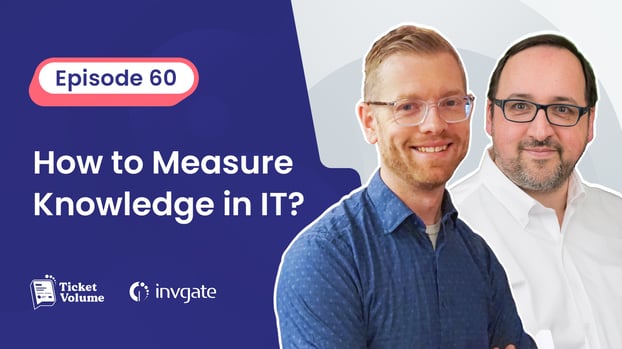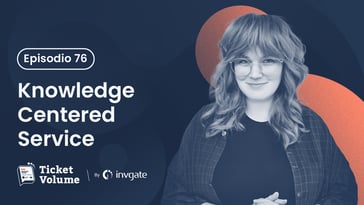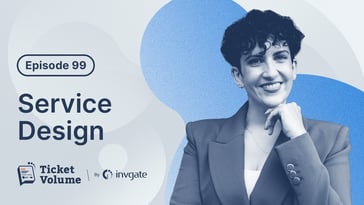In the world of IT, knowledge and skills are two essential components that can make or break a professional's career. While knowledge refers to theoretical understanding, skills are practical abilities that are developed through experience and practice. But which one is more important?
On the 60th Episode of Ticket Volume, our IT podcast, Mathew Burrows shared insights on successful learning processes for IT professionals, encompassing both theory and applied learning. He encourages professionals to create a skills profile and development plan to stay relevant and excel in their careers. With his extensive experience in improving Digital Skills Management Maturity for companies and governments, Matthew's expertise is invaluable.
Matthew's contributions to the field are remarkable, having served as President of the Institute of Service Management and made significant contributions to Service Management and Project Management standards and publications. His passion for IT skills development is evident, and his advice will inspire you to reach new heights in your professional journey.
Be sure to catch the full episode featuring Mathew Burrows. So, whether you're a seasoned IT professional or just starting out, tune in to this episode and learn from one of the best in the business.
And don't forget, you have the opportunity to join our monthly live recordings, where you can ask your questions directly during the session. Don't miss out on this valuable opportunity to learn from industry experts.

Knowledge vs Skills
Burrows explored the distinction between knowledge and skills in the IT field. He delved into the importance of measuring and developing both aspects to ensure success in the digital industry. Let's dive into this fascinating topic.
Knowledge and skills are two interconnected yet distinct elements in the IT industry.
Knowledge refers to the theoretical understanding of concepts, principles, and facts. It encompasses the information one has acquired through education, training, and experience.
On the other hand, skills are the practical application of that knowledge. They involve the ability to perform specific tasks, solve problems, and achieve desired outcomes.
In today's rapidly evolving digital landscape, having up-to-date knowledge is required. Technology advancements, new methodologies, and emerging trends require professionals to stay informed and continuously learn. Without a solid foundation of knowledge, it is challenging to keep pace.
However, for Burrows knowledge alone is not enough. The ability to apply that knowledge effectively through skills is equally essential. Skills are developed through practice, experience, and hands-on application of knowledge. They enable professionals to translate their theoretical understanding into real-world solutions.
|
|
"Everybody's finding a difference between now and 10 or 20 years ago. The rate of change is much more rapid, and this holds true for our skills and competencies as well. According to Gartner, the skills and competencies mentioned in job descriptions change roughly 10 times every year. In the past, we may have worked in organizations where a job description remained unchanged for five or six years, but that simply doesn't happen anymore. The same applies to our own skills. We constantly develop new skills based on the projects we've recently completed or the tasks we've performed." Mathew Burrows |
Measuring knowledge and skills is a complex task. This is because traditional methods, such as academic degrees or certifications, primarily focus on assessing knowledge. While these credentials demonstrate a certain level of understanding, they do not necessarily guarantee practical proficiency.
So, here is where frameworks like SFIA come into play.
The Skills Framework for the Information Age
SFIA provides a comprehensive framework for measuring both knowledge and skills. It offers standardized descriptions for different skill levels, allowing professionals to assess their expertise accurately. Burrows said that using this framework helps identify their strengths and areas for improvement, enabling them to take targeted actions to enhance their skills.
|
|
"SFIA it's a common language for describing skills and competencies in the digital IT industry, including software engineering, project management, business analysis, and other technology-related skills. It provides standardized descriptions, which are essential to avoid misunderstandings and arguments over definitions. SFIA simplifies communication and ensures a clear understanding of skills and competencies in the industry." Mathew Burrows |
Organizations can also benefit from measuring knowledge and skills. It is about understanding the capabilities of their workforce, they can identify skill gaps and make informed decisions regarding training, recruitment, and project assignments. This data-driven approach ensures that the right people are in the right roles, maximizing productivity and driving success.
Burrows explained that to develop knowledge and skills effectively, a holistic approach is necessary. This includes a combination of formal education, practical experience, and continuous learning. Professionals should seek opportunities to apply their knowledge in real-world scenarios, collaborate with experienced practitioners, and embrace new challenges.
Embracing self-sufficiency and accessibility
Self-sufficiency and accessibility are vital elements in skills development. Burrows believes individuals and organizations should take ownership of their skills and competencies. Embracing self-sufficiency means actively identifying areas for improvement, setting goals, and taking the necessary steps to acquire new skills or enhance existing ones. This proactive approach empowers individuals to adapt to changing demands and remain competitive in their respective fields.
Equally important is accessibility in skills development. Creating an environment where learning opportunities and resources are readily available to all is key. This involves removing barriers such as financial constraints, geographical limitations, and technological disparities.
Hence organization should be promoting accessibility to individuals from diverse backgrounds can access educational materials, training programs, and mentorship opportunities that can help them develop their skills.
Burrow knows this benefits individuals in their personal and professional development, while also contributing to the overall success and innovation of organizations. Ultimately, self-sufficiency and accessibility empower individuals to thrive in a rapidly evolving world and drive positive change in their communities.
The reality is knowledge and skills are two interconnected components that are vital for success in the IT industry. While knowledge provides the foundation, skills enable professionals to apply that knowledge effectively. Measuring and developing both aspects through frameworks like SFIA ensures that individuals and organizations can thrive in the fast-paced digital landscape. So, keep learning, practicing, and evolving to stay ahead in the ever-changing world of IT.
Bottom line
This is just a summary of Ticket Volume's episode featuring Mathew Burrows. Be sure to listen to the full discussion with Matt Beran to learn more about knowledge vs. skills.
You can find the full episode on popular platforms like Apple Podcasts, Spotify, YouTube, or any other podcast platform you prefer. Remember to subscribe if you're interested in joining the monthly live recordings!















